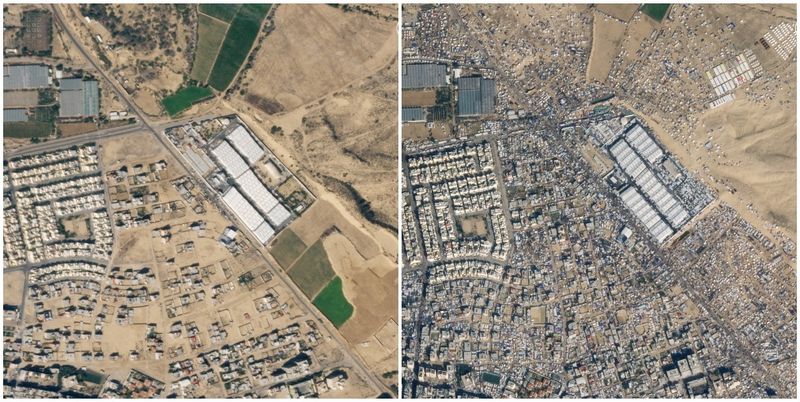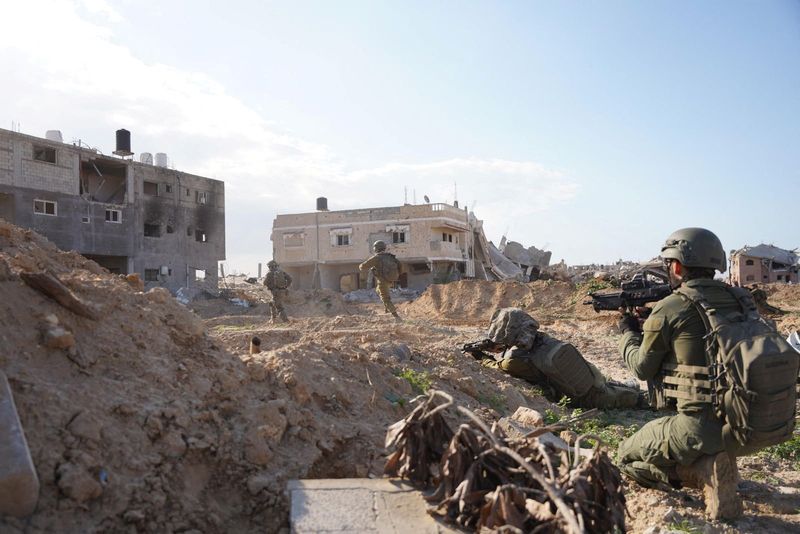By Nidal al-Mughrabi and Maayan Lubell
CAIRO/JERUSALEM (Reuters) -Israeli forces carried out arrests in Gaza's largest functioning hospital, health officials and the military said on Saturday, as airstrikes hit across the enclave and rain battered Palestinians taking shelter in Rafah.
Israeli forces raided the Nasser Hospital in Khan Younis on Thursday as they pressed their war on Hamas, the Palestinian Islamist group that rules the enclave.
"Occupation forces detained a large number of medical staff members inside Nasser Medical Complex, which they (Israel) turned into a military base," said Gaza Health Ministry spokesman Ashraf al-Qidra.
Israel's Prime Minister Benjamin Netanyahu on Saturday pledged to push on with the military campaign and said troops would move into the southern border city of Rafah.
The Israeli military said it was hunting for militants in Nasser and had so far arrested 100 suspects on the premises, killed gunmen near the hospital and found weapons inside it.
Hamas has denied allegations that its fighters use medical facilities for cover. At least two released Israeli hostages have said they were held in Nasser and Israel has released pictures and videos supporting its claim that Hamas operates within medical compounds.
The Israeli incursion into the hospital has raised alarm about patients, medical workers and displaced Palestinians sheltering there.
About 10,000 people were seeking shelter at the hospital earlier this week, but many left either in anticipation of the Israeli raid or because of Israeli orders to evacuate, the Gaza Health Ministry said.
Further south in Rafah, where more than half of Gaza's 2.3 million population are sheltering, the winter cold added to already dire conditions when wind blew away some tents of the displaced and rain flooded others.
INTERNATIONAL CONCERN FOR RAFAH
Israeli plans to storm Rafah have prompted international concern that such action would sharply worsen the humanitarian crisis in Gaza.
Netanyahu said Israel was intent on taking out Hamas battalions in Rafah - regardless of whether a deal was reached to free the remaining Israeli hostages - and that there will be room to evacuate the civilian population, including in areas north of the city.
"But we need to be sure to do this in an orderly fashion. That's the directive I gave to the IDF (Israel Defense Forces). The IDF is doing it and preparing it."
"Yes, there is a lot of opposition in the world, but this is exactly the moment we have to stand and say 'we will not do half the work or three-quarters of the work'."
Hamas chief Ismail Haniyeh blamed Israel for a lack of progress in achieving a ceasefire deal in Gaza, the group said in a statement on Saturday.
Haniyeh added that Hamas would not accept anything less than a complete cessation of hostilities, Israeli withdrawal from Gaza, and "lifting of the unjust siege," as well as a release of Palestinian prisoners serving long sentences in Israeli jails.
Israel's air and ground offensive has devastated much of Gaza and forced nearly all of its inhabitants from their homes. Palestinian health authorities say 28,858 people, mostly civilians, have been killed.
The war began when Hamas sent fighters into Israel on Oct. 7, killing 1,200 people, mostly civilians, and seizing 253 hostages, according to Israeli tallies.
At least 83 people were killed in airstrikes across the Gaza Strip since Friday, health officials said, including one person on Saturday in Rafah, an area that borders Egypt and which Israel says is Hamas' last bastion.
Residents and medics said more died as night fell on Saturday when Israeli warplanes carried several airstrikes on at least seven houses, killing and wounding dozens of people. Hamas media outlets put the number of those killed at 38. The Israeli army spokesperson said they were checking into the reported strikes.

The Israeli military said its jets had killed numerous militants in Gaza fighting since Friday.
Across the border, air raid sirens warning of incoming rockets sounded in the southern Israeli city of Ashkelon on Saturday.
